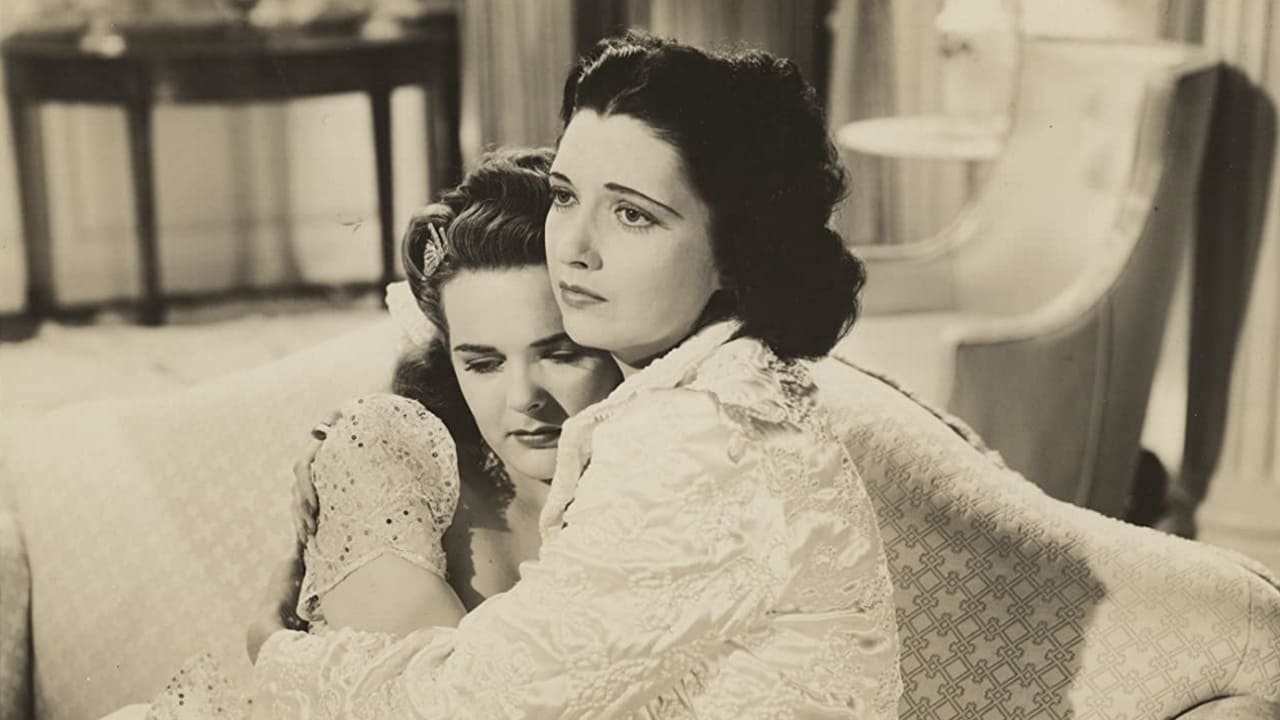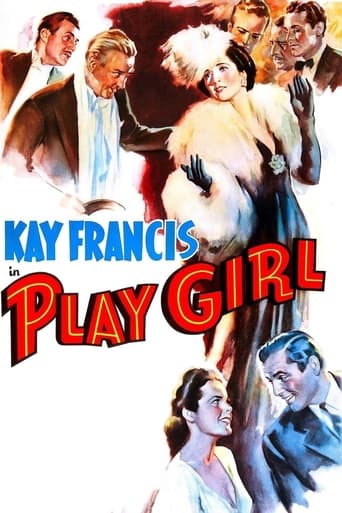

Kay Francis made her last movie under contract for Warners in 1939 and the last years had been one humiliation after another. By the end of 1940 she had flitted between Universal and RKO, each film a little worse than the one before. All through this she was having a ghastly affair with an alleged German aircraft manufacturer, Baron Barnekow and the gossip columnists were at pains to point out Kay's advancing age!!! To top it all Kay was forced to accept pictures like "Play Girl" about an ageing gold-digger who has a showdown at the end with a potential groom's mother, who points out - "He could be your own son Grace" and "You're two years older than me you know". Well may Kay lament (as she does in the movie) "It's tough to be a woman"!!!You often read where Kay never looked her best in these later movies but I thought she looked positively radiant as Grace Herbert, an older gold-digger fallen on hard times. A young girl, Ellen (Mildred Coles, who finished her sparse career in Westerns) has applied for a job as Grace's secretary, but Grace finds her innocent and conscientious and also finds potential. She will make a new girl of her, she can be her age, have fun and earn money at the same time.First "cab off the rank" is Bill (Nigel Bruce) an old flame of Graces. Kay shows she has a real flair for comedy as she and Ellen rehearse what Ellen will say and how Bill will respond. Kay is "spot on" in her biting imitation of his remarks - "not got lumbago - well, all the best doctors must be wrong then hahaha"!! that when Bill is actually playing the scene it falls quite flat. While Ellen gets into the swing of it, she has already lost her heart to Tom (Jim Ellison, also from Westerns), a cowboy, who helped them fix a flat tyre when they were on the road. Because he jumped from the train, Grace dismisses him as just a cowboy but when it turns out that he is a millionaire, suddenly Ellen doesn't find gold digging fun anymore.I really enjoyed it - reading that it was a comedy, I thought could Kay do it - but she did with flying colours. Bill's mother (Katherine Alexander) and Grace become friends and the film ends with Grace happily getting ready to meet an uncle of Bill's, someone who is going to put an end to her "play girl" days. Margaret Hamilton was good as Grace's cynical friend and good old Kane Richmond had rather a small part as a suitor who is not what he appears.
... View MoreKay Francis is a "Play Girl" in this 1941 film that was yet another attempt by Warner Bros. to get rid of the expensive Francis, though none of their ploys worked. Here, they've lent her to another studio, RKO.Francis plays Grace Herbert, a woman who has lived her life as a gold-digger, except now she's getting too old to dig and no one wants to give her any gold. She meets a young woman, Mildred (Ellen Daley) and teaches her the gold-digging game, with the idea that the young woman will actually get married to someone wealthy, something that Grace never did. But Mildred's conscience takes a hit.One of the best things about this film is that one of the marks is a rich guy from Chicago, played by the very British Nigel Bruce. Just goes to show you the attention paid to the casting.It's not a great film, but Francis makes it more than palatable, and it's a pleasant way to pass the time. Worth seeing for Francis.
... View MoreI think Kay Francis is an acquired taste that I am still acquiring. This film is not a great vehicle, but oddly, I liked Kay in this role better than I do most of her films. Her character is usually very long- suffering. But here she plays "Grace." She is an aging gold-digger rapidly reaching the point of no-return, and she realizes it. Yet she doesn't respond with melodrama, but with a plan to sponsor a protégé, passing on her "wisdom" in exchange for a share of the young woman's "earnings." Despite the rather seamy subject matter, however, this film and Francis' role are both much lighter than most of her vehicles.It provides a very predictable, formulaic plot and very few laughs. But the two best scenes are humorous, even if not hilarious, and make this film worth seeing. Early in the film, Grace is coaching her protégé, Ellen, before her first date with her first "mark," Nigel Bruce. It is as if they are rehearsing a play, with Kay assuming Nigel's role. In her coaching, she not only anticipates every line, verbatim, that he later uses for real, but she gives a very funny imitation of Bruce's very distinctive British accent.In a later scene in a steam bath, Bruce assumes Kay's persona in describing to another intended "mark" how the two women fleeced him in Chicago. Straight into the camera, he quotes Kay as she had addressed him: "If you want to make her vewy, vewy happy, get her a mink coat." I wondered whether it was an ad lib or it was scripted. But what I really wondered was how Kay, herself, took the spoof. Her difficulty pronouncing the letter, "R," was legendary. Yet she seems so upbeat in this movie that it leaves the impression that she must have been a good sport about it.I fault the ending not because it was a fairy-tale wrap-up, but because it was abrupt and rather disjointed. The central focus of the movie is the romance between Tom and Ellen, but the central character is Grace. When the movie ended with the off-screen reconciliation of Tom and Ellen, and Grace's anticipating a happy ending with a completely unknown man, I felt like I had been deprived of seeing the resolution of either the film's central story or its central character.The character of Tom's uncle should have been a larger role, bringing him into a slowly growing relationship with Kay. After all, she spends most of her time lounging around in a negligee while Ellen and her beaus are out on the town. Giving the uncle a larger, continuous presence would have provided greater continuity and a nice sub-plot. As it is, Kay's presumptive happy ending is diminished, since it is with a virtual non-entity. We have seen him only once in the early part of the film, riding in a boxcar with Tom and some horses to Chicago. I don't recall whether he even has any lines. In the end, we never see him. He's in the lobby of Kay's apartment while she delightedly prepares to meet her "last" man. Neither one is apparently even on the other's radar screen. I would have liked that relationship to have been developed for the fairy-tale. I also wanted to see Tom and Ellen reconciled in person. These changes might have resulted in a non-musical romantic comedy in the mode of the Fred Astaire-Ginger Rogers/Edward Everett Horton-Helen Broderick foursome in some of the Astaire-Rogers films. It would have been far more satisfying and really improved this film.
... View MoreWarner Brothers continued its campaign to get Kay Francis to break her contract not just by lowering the quality of her vehicles, not just by loading her dialogue with 'r's or putting her in horse operas, but now by lending her out to other studios. She was the highest-priced actress on the Warner's lot and they didn't want her any more. But she was not going to give up that contract.In this lend-out to RKO, Miss Francis, as usual, gives a wonderful performance. In fact, given the cast of minor players -- including a few long-time favorites of mine like Nigel Bruce and Kane Richmond -- and they give fine performances too, even if we are expected to believe Mr. Bruce hails from Chicago, in this minor comedy. It's about a professional adventuress who is getting a lot too old to play wealthy men for suckers. It's a little slow-starting, but by the half-way mark, it is moving along at a good clip. Definitely worth your while.
... View More